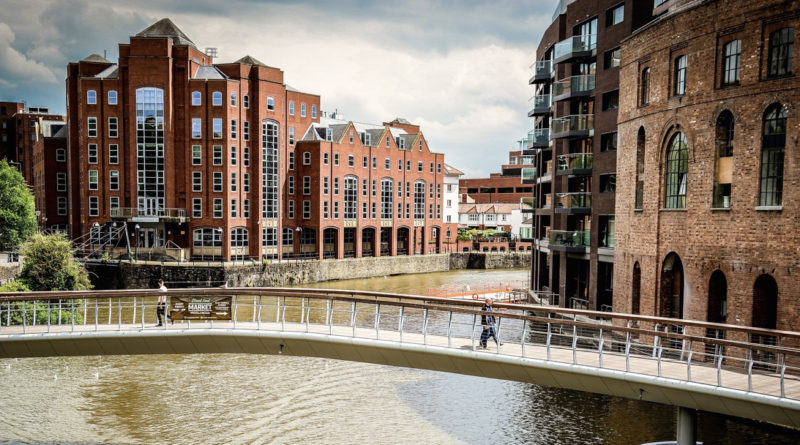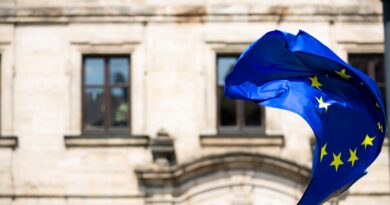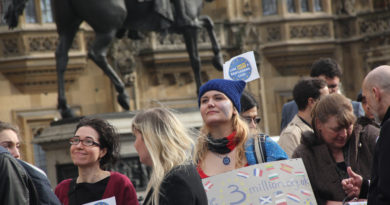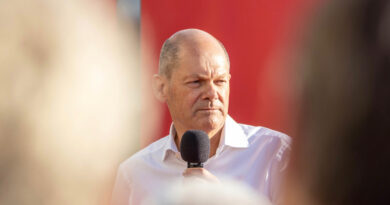“You Don’t Have Rights, You Use Them”
Shortly after the vote on Britain’s membership in the European Union I was invited to the recording of Gary Younge’s programme Eastern Europeans in Brexitland for BBC Radio 4 in Bristol. At that time #postreferendumracism was trending, and the talk about the anxiety felt by Europeans living in Britain started to reach the national media. Our conversation, which involved several Polish citizens, revolved around what to me was a fundamental question for understanding the European perspective on Brexit: what changed around us after the referendum, and what changed within us? To what extent our rights and sometimes our bodies became fair game after the votes were cast, and to what extent the vote revealed our vulnerability that for years went unacknowledged?
In that context I mentioned my interview with a Polish shopkeeper the morning after the referendum, and how he recalled his way to work earlier that day. Normally feeling at home in Bristol, the morning after he could not help but to wonder whether the people he passed along the way voted to leave. And this, to me, was the biggest change brought by the referendum in the absence of any serious proposals about what Britain is meant to look like outside the EU. While officially nothing changed, not yet anyway, practically a lot changed that day: where there had been trust now there was suspicion; where there had been confidence now there was anxiety.
This change generated tangible political effects. My research on political agency of European citizens in Britain shows that a new space for political action and civic engagement opened up once their vulnerability got exposed through the referendum. In this blog I outline an unprecedented political mobilisation I documented in the aftermath of the vote – from rallies to more sustained and organised forms of political action – to argue that recognition of vulnerability is an important catalyst for claiming, or using, rights.
Certain Uncertainty
In a recent blog Jon Fox wrote that “Post-Brexit Britain has become a world of ‘what ifs’, and until documents are signed in Brussels it will remain as such. It’s not Brexit we need to deal with, it’s the uncertainty Brexit has created”. It is very true in a sense, and yet I find the narrative of uncertainty somewhat problematic. Taking back control comes with more ‘what ifs’ than one can count, of course, but we also know for certain what is at stake and what needs to be protected: the rights of citizens, once taken for granted, are now clearly a subject of political struggles.
If there is one thing which the referendum device revealed for certain, it is that our rights are ours only for as long as our governments underwrite them, and only in as much as our courts enforce them. In the cognitive vacuum of red, white and blue Brexit nothing is less uncertain than the need to defend the rights that are at risk. This requires people organising, coming together, articulating demands, and holding to account: it requires people using their rights. This urgent need seems to be the driver behind #BristolBrexit, the call to action launched by Bristol, Bath, and the West of England universities in May 2017. Its aim is “not to condemn or endorse Brexit” as Fox says, but to do something about its consequences that, while uncertain, are already being felt.
Using Rights, Enacting Citizenship
Reflecting on the political agency of European citizens before and after the referendum, I find the political mobilisation that the vote to leave generated remarkable. For over two years now I have been researching precarious citizenship, that is the space for political action opened up by the vulnerability of people who live in the UK and yet lack the full rights of political participation. In Bristol, which I had selected as my research site, I found multiple modes of being political: from local and external voting practices and self-help within informal networks, through voluntary and community work, to mainstream labour organising. What I did not find, not until after the votes were cast anyway, was any sign of grassroots organising around European citizenship. Undoubtedly some of my research participants felt European, but they did not seem to think this identity was a solid enough base for political mobilisation.
While leafleting in the city centre one Friday night in June – partly motivated by my commitment to participatory observation but mainly by the sheer dread about possible consequences of the vote to leave – I spoke to many young European citizens. Their instinct invariably was to refuse flyers and say that they were not eligible to vote. This shows that attitudes to political participation are strongly shaped by a sense of political enfranchisement and disenfranchisement, something that Emilia Pietka-Nykaza and Derek McGhee explore in more depth in their comparative research on Polish citizens’ perspective on Independence and European referenda in Scotland. However, my empirical material points to the time after the referendum as the moment when some European citizens decided to act because of this acute sense of political disenfranchisement and vulnerability of their rights.
Within days from the referendum there was unprecedented civic mobilisation in Bristol. On 28th June a rally was held on College Green opposite the City Hall and two thousand people turned up. Some were European citizens holding their national flags: Bulgarian, Czech, Dutch, French, German, Polish, and others. On 10th June there had been a smaller meeting initially aimed at the Francophone community in Bristol but at the last minute organisers extended it to involve all Bristol residents whose rights would be affected by Brexit. Over 180 people turned up and while the majority of those who took the floor identified themselves as French, there were also people from Bulgaria, Germany, Poland, Portugal, Romania, and a Dutch-Somali community activist.
The mood at the meeting was frantic with people sharing their stories of long-term residence or of recent arrival in Britain, but in all cases expressing anxiety about their future. Many worried they would not qualify for permanent residence cards as these are only issued to qualified persons, that is those who meet the Home Office’s stringent regulations that implement or – depending on who you ask – frustrate the implementation of the European Citizens’ Rights Directive. There was even a widowed pensioner who has lived in Britain for over 50 years and worried she would not qualify now that her British husband passed away and given she no longer had a job or private health insurance, an obscure requirement routinely used by the Home Office to turn down students, parents, and elderly applicants for permanent residence.
After this meeting the3million campaign was formed, its name derived from the approximate number of EU citizens living in Britain. It engaged thousands of EU citizens through a Facebook-based online forum, which by now has well over 30,000 members, and quickly attained media visibility as real stories of ordinary people being denied their residence rights gained prominence. It highlighted the vulnerability of EU residents and, given that the assurances of continuity of EU citizens’ rights issued by the Vote Leave campaign did not become part of the UK government’s offer, turned it into a powerful claim about rights being violated and promises broken. At the same time, the3million carefully maintained their impartiality on party politics and on the issue of Brexit to assertively argue for citizens’ rights – not more, not less.
The campaign is now reaching far beyond Bristol. In February 2017 the3million worked with Unison and New Europeans to organise as mass lobby of parliament, and gave evidence to the Exiting the European Union Committee at the House of Commons. The campaign also built an alliance with British in Europe, a coalition of grassroots groups of UK residents living in EU27 countries, which only strengthens its claim to European citizenship. In March, its representatives met the European Commission’s negotiating team with its chief Michel Barnier in Brussels, and they gave evidence to the European Parliament in May. And, slowly but steadily, the issue of EU citizens’ rights – both British abroad and EU residents living in Britain – rose to the top of the list of priorities for Brexit negotiations. Aside from being effective, the campaign had another important consequence: as one of its prominent early advisors and supporters put it, “the3million gave people a sense of agency.”
Being European about Brexit
Following the referendum this sense of agency is increasingly articulated through the notion of European citizenship, barely mentioned during the last year’s campaign. What were the circumstances that made people think of themselves as European citizens, then? According to Nicolas Hatton, co-chair of the3million, it happened within weeks of the referendum. He said: “I think the refusal of the British government to grant Europeans their right to stay, that was the point. People felt togetherness because… Together, they were refused the right to stay.”
At one of the meetings organised by the3million in Bristol, an immigration solicitor told participants that the struggle is “not about the rights you have, but how you use them”. The unfolding story of European citizenship illustrates the extra-ordinary ways of using rights and shows the importance of civic mobilisation and everyday activism regardless of the rights of political participation. It is a story of people coming together because their rights are violated, and putting their time and skills to claim them back. It shows that recognition and articulation of vulnerability is a powerful catalyst for political mobilisation in the context of European rights and Brexit.
Kuba Jablonowski
This article was originally published on The Sociological Review on 13 July 2017 and is re-published here with permission.
Kuba Jablonowski is a doctoral candidate in geography at the University of Exeter. His research is on Precarious citizenship: Political agency of EU migrant citizens in the UK. @jablonow.
Photo: Bristol via Pixabay.





